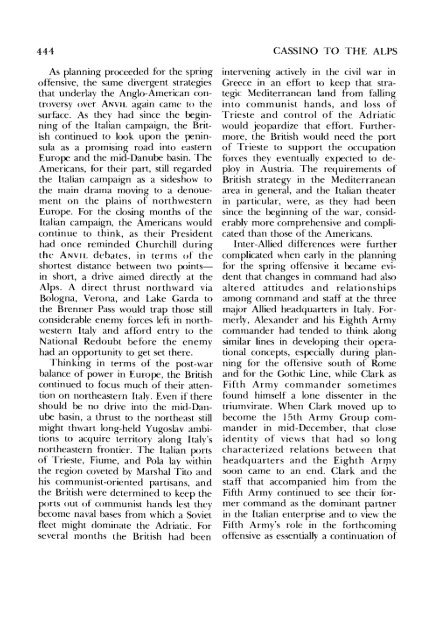Cassino to the Alps - US Army Center Of Military History
Cassino to the Alps - US Army Center Of Military History
Cassino to the Alps - US Army Center Of Military History
You also want an ePaper? Increase the reach of your titles
YUMPU automatically turns print PDFs into web optimized ePapers that Google loves.
444<br />
As planning proceeded for <strong>the</strong> spring<br />
offensive, <strong>the</strong> same divergent strategies<br />
that underlay <strong>the</strong> Anglo-American controversy<br />
over ANVIL again came <strong>to</strong> <strong>the</strong><br />
surface. As <strong>the</strong>y had since <strong>the</strong> beginning<br />
of <strong>the</strong> Italian campaign, <strong>the</strong> British<br />
continued <strong>to</strong> look upon <strong>the</strong> peninsula<br />
as a promising road in<strong>to</strong> eastern<br />
Europe and <strong>the</strong> mid-Danube basin. The<br />
Americans, for <strong>the</strong>ir part, still regarded<br />
<strong>the</strong> Italian campaign as a sideshow <strong>to</strong><br />
<strong>the</strong> main drama moving <strong>to</strong> a denouement<br />
on <strong>the</strong> plains of northwestern<br />
Europe. For <strong>the</strong> closing months of <strong>the</strong><br />
Italian campaign, <strong>the</strong> Americans would<br />
continue <strong>to</strong> think, as <strong>the</strong>ir President<br />
had once reminded Churchill during<br />
<strong>the</strong> ANVIL debates, in terms of <strong>the</strong><br />
shortest distance between two pointsin<br />
short, a drive aimed directly at <strong>the</strong><br />
<strong>Alps</strong>. A direct thrust northward via<br />
Bologna, Verona, and Lake Garda <strong>to</strong><br />
<strong>the</strong> Brenner Pass ,,,,ould trap those still<br />
considerable enemv forces left in northwestern<br />
Italy and' afford entry <strong>to</strong> <strong>the</strong><br />
National Redoubt before <strong>the</strong> enemv<br />
had an opportunity <strong>to</strong> get set <strong>the</strong>re. ;<br />
Thinking in terms of <strong>the</strong> post-war<br />
balance of power in Europe, <strong>the</strong> British<br />
continued <strong>to</strong> focus much of <strong>the</strong>ir attention<br />
on nor<strong>the</strong>astern Italy. Even if <strong>the</strong>re<br />
should be no drive in<strong>to</strong> <strong>the</strong> mid-Danube<br />
basin, a thrust <strong>to</strong> <strong>the</strong> nor<strong>the</strong>ast still<br />
might thwart long-held Yugoslav ambitions<br />
<strong>to</strong> acquire terri<strong>to</strong>ry along Italy's<br />
nor<strong>the</strong>astern frontier. The Italian pons<br />
of Trieste, Fiume, and Pola lay within<br />
<strong>the</strong> region coveted by Marshal Ti<strong>to</strong> and<br />
his communist-oriented partisans, and<br />
<strong>the</strong> British were determined <strong>to</strong> keep <strong>the</strong><br />
ports out of communist hands lest <strong>the</strong>y<br />
become naval bases from v,:hich a Soviet<br />
fleet might dominate <strong>the</strong> Adriatic. For<br />
several months <strong>the</strong> British had been<br />
CASSINO TO THE ALPS<br />
intervening actively in <strong>the</strong> civil war in<br />
Greece in an effort <strong>to</strong> keep that strategic<br />
Mediterranean land from falling<br />
in<strong>to</strong> communist hands, and loss of<br />
Trieste and control of <strong>the</strong> Adriatic<br />
would jeopardize that effort. Fur<strong>the</strong>rmore,<br />
<strong>the</strong> British would need <strong>the</strong> port<br />
of Trieste <strong>to</strong> support <strong>the</strong> occupation<br />
forces <strong>the</strong>y eventually expected <strong>to</strong> deploy<br />
in Austria. The requirements of<br />
British strategy in <strong>the</strong> Mediterranean<br />
area in general, and <strong>the</strong> Italian <strong>the</strong>ater<br />
in particular, were, as <strong>the</strong>y had been<br />
since <strong>the</strong> beginning of <strong>the</strong> war, considerably<br />
more comprehensive and complicated<br />
than those of <strong>the</strong> Americans.<br />
Inter-Allied differences were fur<strong>the</strong>r<br />
complicated when early in <strong>the</strong> planning<br />
for <strong>the</strong> spring offensive it became evident<br />
that changes in command had also<br />
altered attitudes and relationships<br />
among command and staff at <strong>the</strong> three<br />
major Allied headquarters in Italy. Formerly,<br />
Alexander and his Eighth <strong>Army</strong><br />
commander had tended <strong>to</strong> think along<br />
similar lines in developing <strong>the</strong>ir operational<br />
concepts, especially during planning<br />
f(H' <strong>the</strong> offensive south of Rome<br />
and for <strong>the</strong> Gothic Line, while Clark as<br />
Fifth <strong>Army</strong> commander sometimes<br />
found himself a lone dissenter in <strong>the</strong><br />
triumvirate. When Clark moved up <strong>to</strong><br />
become <strong>the</strong> 15th <strong>Army</strong> Group commander<br />
in mid-December, that close<br />
identity of views that had so long<br />
characterized relations between that<br />
headquarters and <strong>the</strong> Eighth Anpy<br />
soon carne <strong>to</strong> an end. Clark and <strong>the</strong><br />
staff that accompanied him from <strong>the</strong><br />
Fifth <strong>Army</strong> continued <strong>to</strong> see <strong>the</strong>ir former<br />
command as <strong>the</strong> dominant partner<br />
in <strong>the</strong> Italian enterprise and <strong>to</strong> view <strong>the</strong><br />
Fifth <strong>Army</strong>'s role in <strong>the</strong> forthcoming<br />
offensive as essentially a continuation of
















